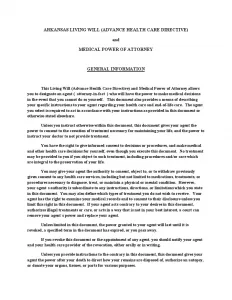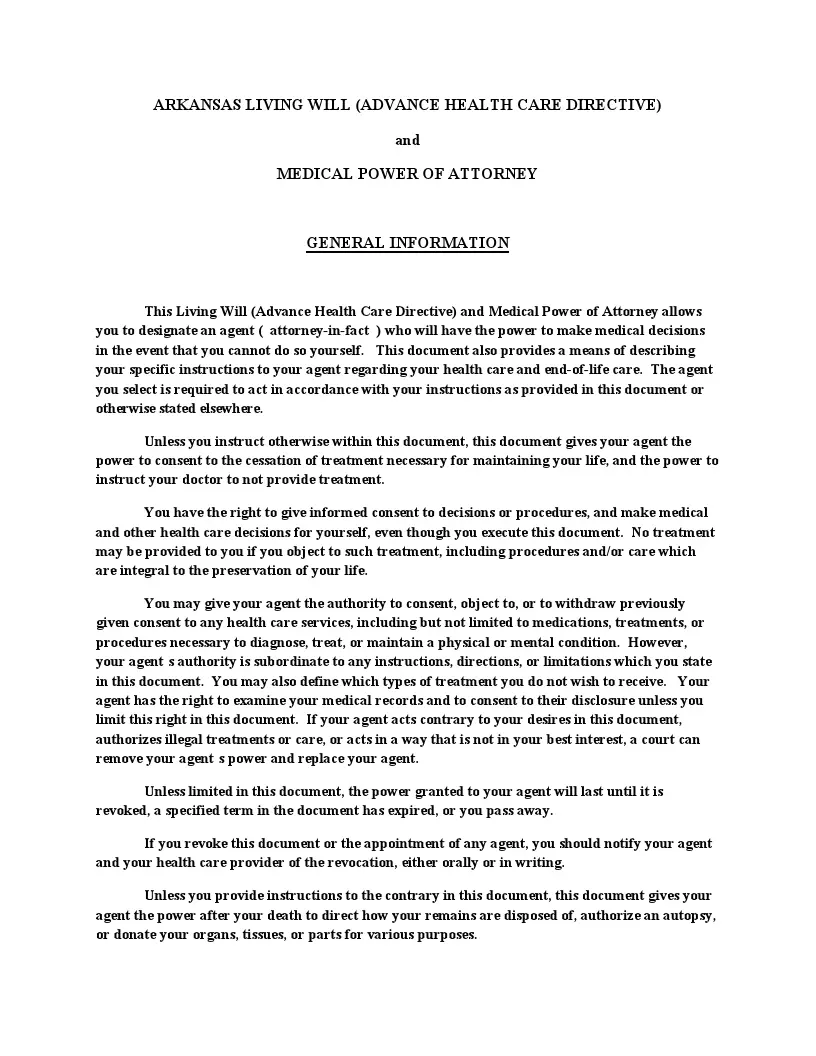Free Arkansas Living Will Form
In Arkansas, a living will is a legal document that allows a person to outline their wishes regarding medical treatment and care in situations where they cannot communicate their decisions due to illness or incapacity. A living will template primarily addresses end-of-life care decisions, such as the use or refusal of life-sustaining treatments when an individual is terminally ill, permanently unconscious, or in a similar condition.
To be valid, the Arkansas living will must be signed by the person creating the will (the declarant) in the presence of two witnesses. The witnesses must be adults and cannot be related to the declarant by blood or marriage, entitled to any portion of the declarant’s estate, financially responsible for the declarant’s medical care, or directly involved in providing health care to the declarant.
Signing Requirements and Laws
In Arkansas, the signing requirements and laws governing living wills are specified in the Arkansas Rights of the Terminally Ill or Permanently Unconscious Act, which can be found under Arkansas Code Annotated §§ 20-17-201 to 20-17-214. Below are the specific legal requirements for signing a living will in Arkansas, as detailed in the relevant sections of the code (§ 20-17-202):
- The declarant or another individual must sign the living will in the declarant’s presence and at the declarant’s direction.
- The signing must occur in the presence of two witnesses, who must also sign the document. Witnesses must be at least 18 years of age.
- Witnesses should not be related to the declarant by blood or marriage, entitled to any part of the declarant’s estate upon death under any will or codicil, financially responsible for the declarant’s medical care, or directly involved in providing health care to the declarant.
Arkansas does not require a specific form for a living will, though many people use standardized forms to ensure all legal aspects are covered. The living will should clearly state the declarant’s wishes regarding providing, withholding, or withdrawing life-sustaining treatment and artificially providing nutrition and hydration. It should also specify under what conditions these wishes should be followed, typically when the declarant is diagnosed as being terminally ill or permanently unconscious by the attending physician.
In Arkansas, a living will can be revoked at any time and in any manner by which the declarant can communicate the intent to revoke, regardless of mental or physical condition. The revocation is effective upon communication with the attending physician or other health care provider.
In addition to a living will, Arkansas residents may also create a health care power of attorney, which appoints someone else (a health care agent) to make medical decisions on their behalf.
Arkansas Living Will Form Details
| Document Name | Arkansas Living Will Form |
| State Form Name | Arkansas Advance Care Plan Form |
| Signing Requirements | Two Witnesses |
| Validity Requirements | §§ 20-17-202 to 20-17-203 |
| Powers Limitation | §§ 20-17-204 to 20-17-205 |
| State Laws: Arkansas Code Annotated, Sections 20-17-201 to 20-17-214 | |

Steps to Fill Out the Form
The Arkansas living will form allows you to outline your wishes regarding life-sustaining treatments and appoint an agent to decide on your behalf if necessary. To ensure your directives are clearly stated and legally binding, follow these steps carefully when filling out the living will form.
1. Personal and Agent Information
Begin by entering your full name as the declarant of the advance care plan. Then, specify the individual you wish to designate as your health care agent. Include their name, phone number, relationship to you, and address. If applicable, also name an alternate agent who will take over if your primary agent cannot fulfill their role.
2. Quality of Life Considerations
In the section labeled “Quality of Life,” mark the conditions under which you would consider your quality of life unacceptable. Options include permanent unconsciousness, permanent confusion, dependency in all activities of daily living, and end-stage illnesses. Check the relevant boxes next to each condition to indicate your preferences.
3. Treatment Preferences
Under the “Treatment” heading, decide which medical treatments you would want or not want if your quality of life becomes unacceptable and your condition is irreversible. You will see options like CPR, life support, treatment of new conditions, and tube feeding/IV fluids. For each treatment listed, check either “Yes” or “No” to state whether you want or do not want that specific treatment.
4. Additional Instructions
If you have other specific instructions that have not been covered elsewhere in the form, such as burial arrangements or hospice care preferences, include these in the space provided for “Other instructions.” Attach additional pages if necessary to fully express your wishes.
5. Organ Donation
If you wish to make an anatomical gift upon your death, indicate your choice by marking the appropriate option regarding organ and tissue donation. You can donate any needed organs or tissues and your entire body or specify particular organs or tissues you wish to donate.
6. Signing the Form
Your signature is required to make the document legally binding. The form must either be witnessed by two competent adults or notarized. Witnesses must not be your chosen agents; at least one should not be related to you or entitled to any part of your estate. Each witness must sign the form, acknowledging they witnessed your signature.
7. What to Do After Signing
Once signed, distribute copies of the advance directive as follows:
- Provide a copy to your physician(s) to include in your medical records.
- Keep a copy in your files where it is easily accessible.
- Inform close relatives and friends about the contents of the document.
- Give a copy to the person(s) you have named your health care agent.
Following these steps ensures that your health care preferences are documented and respected, providing peace of mind to you and your loved ones.

Below are various other Arkansas templates completed by our users. Try our simple builder to customize these forms to your preferences.
